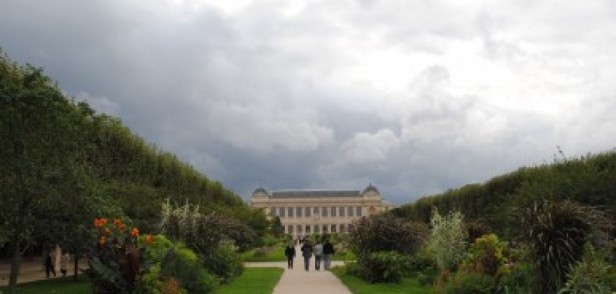
This is the eighth poem in Victor Hugo’s Le Poème du Jardin Des Plantes and the longest. Therefore, I will present the translation of this poem in two sections. Wish I could be there to see this sight and smell the sweet Spring air!
Poem VIII a
by Victor Hugo
C’est une émotion étrange pour mon âme
De voir l’enfant, encor dans les bras de la femme,
Fleur ignorant l’hiver, ange ignorant Satan
Secouant un hochet devant Léviatan,
Approcher doucement la nature terrible.
Les beaux Séraphins bleus qui passent dans la bible,
Envolés d’on ne sait quel ciel mystérieux,
N’ont pas une plus pure aurore dans les yeux
Et n’ont pas sur le front une plus sainte flamme
Que l’enfant innocent riant au monstre infâme.
Ciel noir ! Quel vaste cri que le rugissement !
Quand la bête, âme aveugle et visage écumant,
Lance au loin, n’importe où, dans l’étendue hostile,
Sa voix lugubre, ainsi qu’un sombre projectile,
C’est tout le gouffre affreux des forces sans clarté
Qui hurle, c’est l’obscène et sauvage Astarté,
C’est la nature abjecte et maudite qui gronde !
C’est Némée, et Stymphale, et l’Athos plus hanté
Par les foudres qu’un lac par les mouches d’été ;
C’est Lerne, Pélion, Ossa, c’est Erymanthe,
C’est Calydon funeste et noir, qui sa lamente.
L’enfant regard l’ombre où sont les lions roux.
La bête grince ; à qui s’adresse ce courroux ?
L’enfant jase ; sait-on qui les enfants appellent !
Les deux voix, la tragique et la douce, se mêlent ;
L’enfant est l’espérance et la bête est la faim ;
Et tout deux sont l’attente ; il gazouille sans fin
Et chante, et l’animal écume sans relâche ;
Ils ont chacun en eux un mystère qui tâche
De dire ce qu’il sait et d’avoir ce qu’il veut ;
Leur langue est prise et cherche à dénouer le nœud.
Se parlent-ils ? Chacun fait son essai ; l’un triste,
L’autre charmant ; l’enfant joyeusement existe ;
Quoique devant lui l’Etre effrayant soit debout ,
Il a sa mère il a sa nourrice, il a tout ;
Il rit.
My English Translation
It’s a strange emotion for my soul
To see the child, still in the arms of the woman,
The flower ignorant of winter, the angel ignorant of Satan
Shaking a rattle in front of Leviathan,
Gently approach the frightening nature.
The beautiful blue seraphim in the Bible,
Departed from some mysterious sky,
Do not have a purer dawn in your eyes
And do not have on the forehead a more holy flame
Than the innocent child laughing at the infamous monster
Black heavens! What vast cries that roar!
When the beast, with a blind soul and foaming face,
Throw further, it is not important where, in hostile expanse,
His dismal voice, as well as a somber projectile,
It is all the hideous abyss of forces without clarity
Who screams, it is the obscene and savage Astarté,
It is the abject, cursed nature which roars!
It is Némée, et Stymphale, and profound Africa
It is the ferocious Atlas, it is the plus hante Athos
By the thunderstorms of the lake, by the flies of summer;
It is Lerne, Pélion, Ossa, it is Erymanthe,
It is Calydon fatal and black, who laments.

The child looks at the shadows where the red lions are
The beast grins ; to whom is he addressing ?
The child lies ; who knows what the children are calling !
The two voices, tragic and kind mixed together
The child is hope and the beast is famine ;
And both are waiting ; he is chirping without end
And sings, and the animal foams without stopping
They are each a mystery to those they touch ;
To say what he knows and to have what he wants ;
Their language is at hand and tries to untie the knot.
What are they saying ? Each does his best ; one is sad
The other charming ; the child joyously exists
Though before him the scary BEING is standing,
He has his mother, he a his nourishment, he has all ;
He is laughing.
Copyright 2018 by Robyn Lowrie. May be quoted in part or full only with attribution to Robyn Lowrie (www.frenchquest.com)
Moving translation. Hugo captured the essence of childhood lived in the security of a mother’s arms and love. Reminds me of your touch on our children. Your Loving Husband